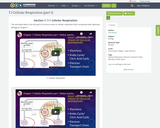
24 Results

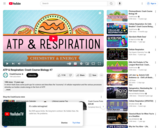
In which Hank does some push-ups for science and describes the "economy" of cellular respiration and the various processes whereby our bodies create energy in the form of ATP.
Chapters:
1) Cellular Respiration
2) Adenosine Triphosphate
3) Glycolysis
A) Pyruvate Molecules
B) Anaerobic Respiration/Fermentation
C) Aerobic Respiration
4) Krebs Cycle
A) Acetyl COA
B) Oxaloacetic Acid
C) Biolography: Hans Krebs
D) NAD/FAD
5) Electron Transport Chain
6) Check the Math
Review
- Subject:
- Biology
- Life Science
- Material Type:
- Lecture
- Provider:
- Complexly
- Provider Set:
- Crash Course Biology (2012)
- Date Added:
- 03/12/2012

Biology is designed for multi-semester biology courses for science majors. It is grounded on an evolutionary basis and includes exciting features that highlight careers in the biological sciences and everyday applications of the concepts at hand. To meet the needs of today’s instructors and students, some content has been strategically condensed while maintaining the overall scope and coverage of traditional texts for this course. Instructors can customize the book, adapting it to the approach that works best in their classroom. Biology also includes an innovative art program that incorporates critical thinking and clicker questions to help students understand—and apply—key concepts.
- Subject:
- Biology
- Life Science
- Material Type:
- Full Course
- Provider:
- Rice University
- Provider Set:
- OpenStax College
- Date Added:
- 08/22/2012
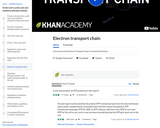
This 17-minute video lesson presents an overview of the Electron Transport Chain. [Biology playlist: Lesson 26 of 71].
- Subject:
- Biology
- Life Science
- Material Type:
- Lecture
- Provider:
- Khan Academy
- Provider Set:
- Khan Academy
- Author:
- Salman Khan
- Date Added:
- 05/18/2012

- Subject:
- Biology
- Life Science
- Material Type:
- Unit of Study
- Provider:
- Rice University
- Provider Set:
- OpenStax College

- Subject:
- Applied Science
- Biology
- Life Science
- Material Type:
- Module
- Author:
- Tina B. Jones
- Date Added:
- 08/16/2019

- Subject:
- Applied Science
- Biology
- Life Science
- Material Type:
- Module
- Date Added:
- 07/10/2017
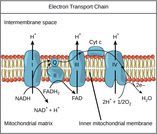
By the end of this section, you will be able to:Describe how electrons move through the electron transport chain and what happens to their energy levelsExplain how a proton (H+) gradient is established and maintained by the electron transport chain
- Subject:
- Applied Science
- Biology
- Life Science
- Material Type:
- Module
- Author:
- Tina B. Jones
- Date Added:
- 08/16/2019

By the end of this section, you will be able to:Describe how electrons move through the electron transport chain and what happens to their energy levelsExplain how a proton (H+) gradient is established and maintained by the electron transport chain
- Subject:
- Applied Science
- Biology
- Life Science
- Material Type:
- Module
- Date Added:
- 07/10/2017
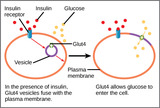
By the end of this section, you will be able to:Describe how feedback inhibition would affect the production of an intermediate or product in a pathwayIdentify the mechanism that controls the rate of the transport of electrons through the electron transport chain
- Subject:
- Applied Science
- Biology
- Life Science
- Material Type:
- Module
- Date Added:
- 07/10/2017

- Subject:
- Applied Science
- Biology
- Life Science
- Material Type:
- Module
- Author:
- Tina B. Jones
- Date Added:
- 08/16/2019

- Subject:
- Applied Science
- Biology
- Life Science
- Material Type:
- Module
- Date Added:
- 07/10/2017

By the end of this section, you will be able to:Explain how plants absorb energy from sunlightDescribe short and long wavelengths of lightDescribe how and where photosynthesis takes place within a plant
- Subject:
- Applied Science
- Biology
- Life Science
- Material Type:
- Module
- Date Added:
- 07/10/2017

By the end of this section, you will be able to:Explain how plants absorb energy from sunlightDescribe short and long wavelengths of lightDescribe how and where photosynthesis takes place within a plant
- Subject:
- Applied Science
- Biology
- Life Science
- Material Type:
- Module
- Author:
- Tina B. Jones
- Date Added:
- 08/16/2019
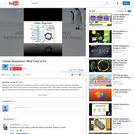
Video tutorial for cellular respiration: overview, glycolysis, citric acid cycle and electron transport chain.
- Subject:
- Life Science
- Material Type:
- Lecture
- Provider:
- The Penguin Prof
- Author:
- The Penguin Prof
- Date Added:
- 10/11/2013

Cellular respiration is the process by which our bodies convert glucose from food into energy in the form of ATP (adenosine triphosphate). Start by exploring the ATP molecule in 3D, then use molecular models to take a step-by-step tour of the chemical reactants and products in the complex biological processes of glycolysis, the Krebs cycle, the Electron Transport Chain, and ATP synthesis. Follow atoms as they rearrange and become parts of other molecules and witness the production of high-energy ATP molecules.
- Subject:
- Life Science
- Material Type:
- Lecture Notes
- Simulation
- Provider:
- Concord Consortium
- Provider Set:
- Concord Consortium Collection
- Author:
- The Concord Consortium
- Date Added:
- 01/13/2012
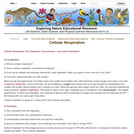
Cellular Respiration Text, Diagrams, Assessments, and Link to Standards
- Subject:
- Life Science
- Material Type:
- Activity/Lab
- Lesson Plan
- Provider:
- Exploring Nature
- Date Added:
- 11/04/2016
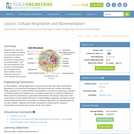
In this lesson, students learn about the basics of cellular respiration. They also learn about the application of cellular respiration to engineering and bioremediation. And, students are introduced to the process of bioremediation and several examples of how bioremediation is used during the cleanup of environmental contaminants.
- Subject:
- Applied Science
- Biology
- Engineering
- Life Science
- Material Type:
- Activity/Lab
- Lesson Plan
- Provider:
- TeachEngineering
- Provider Set:
- TeachEngineering
- Author:
- Janet Yowell
- Kaelin Cawley
- Malinda Schaefer Zarske
- Date Added:
- 09/18/2014

This resource is a video abstract of a research paper created by Research Square on behalf of its authors. It provides a synopsis that's easy to understand, and can be used to introduce the topics it covers to students, researchers, and the general public. The video's transcript is also provided in full, with a portion provided below for preview:
"For over 1,000 years, the extract from Magnolia tree bark has been a popular elixir, treating everything from anxiety to muscle pain. Now, researchers have discovered how Magnolia extract might help treat oral cancer. In mice with oral tumors, the extract suppressed the growth and spread of cancer cells. Experiments revealed three key active compounds responsible for this preventive effect: honokiol, magnolol, and 4-O-methylhonokiol, which are found in many traditional herbal medicines. These compounds acted like poison against oral cancer cells, crippling their ability to fend off harmful oxidants. Understanding how or whether this same mechanism occurs in humans will be crucial, as it could help clarify how Magnolia extract fights cancer and other disorders..."
The rest of the transcript, along with a link to the research itself, is available on the resource itself.
- Subject:
- Biology
- Life Science
- Material Type:
- Diagram/Illustration
- Reading
- Provider:
- Research Square
- Provider Set:
- Video Bytes
- Date Added:
- 05/04/2020
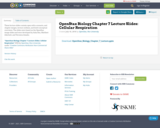
These lecture slides contain open with a scenario, and chapter images, lecture outlines, and brief conceptual overviews. The slides were based on the OpenStax image slides and were developed by Asha Rao, Matthew Aderholt, and Veronica Amaku.
- Subject:
- Life Science
- Material Type:
- Lecture
- Date Added:
- 07/08/2018